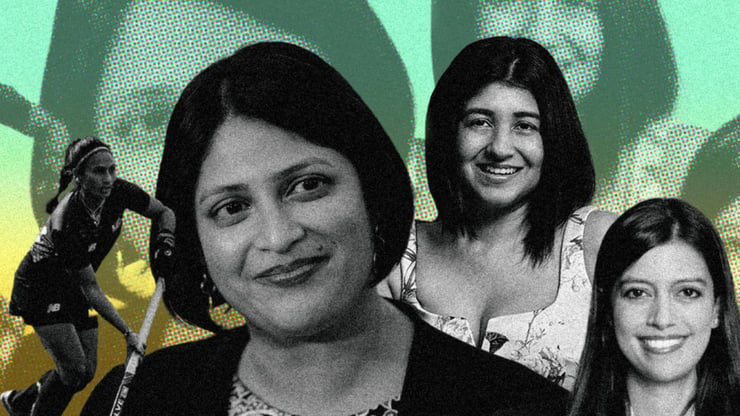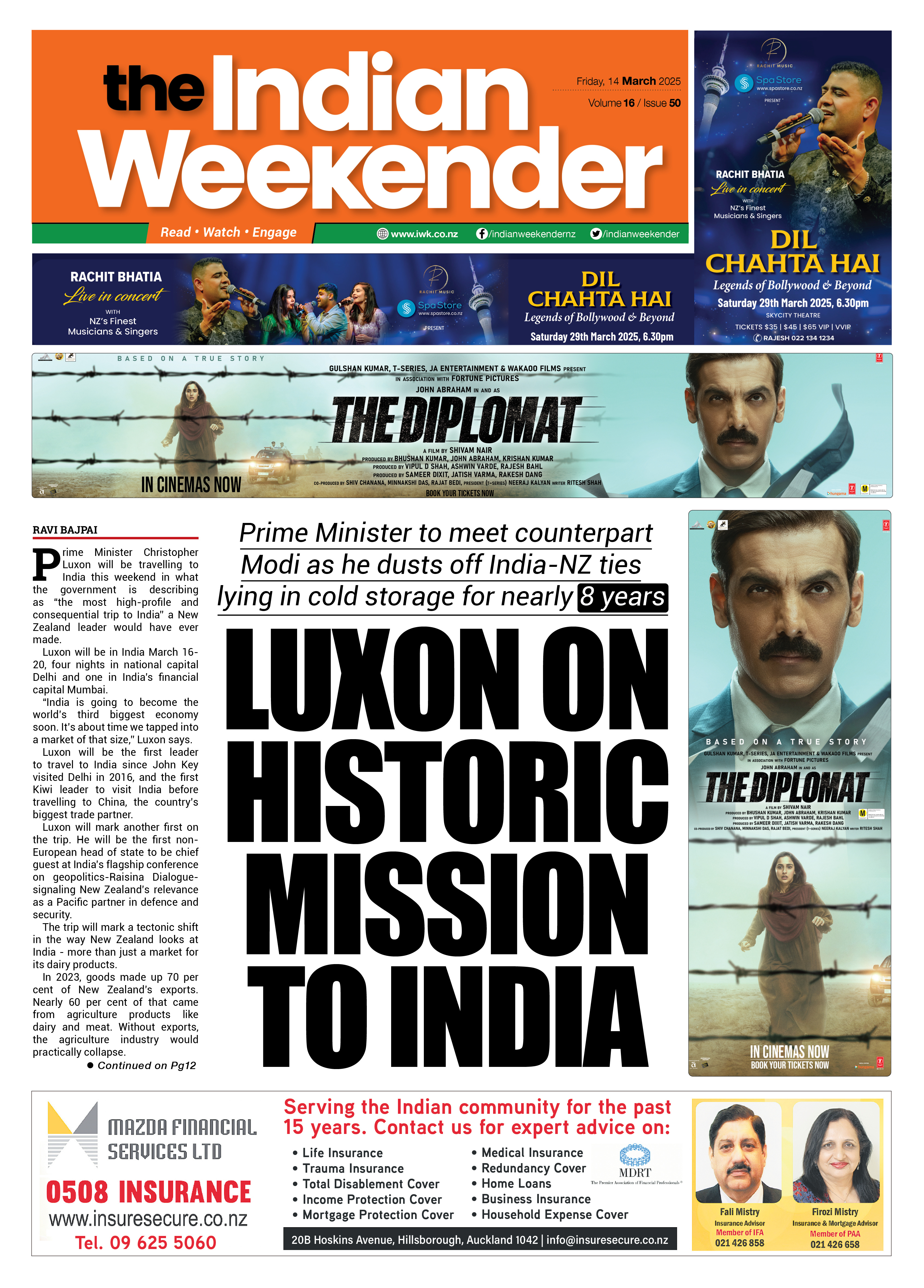Racism Holding Back Indian Women In NZ: How They Fought Back

The proverbial 'glass ceiling' is double-glazed for Indian migrant women in New Zealand, according to new research from Auckland University of Technology.
Business masters graduate Savita Bhaskaran explored the subject for her Master's thesis last year, interviewing 12 Indian migrant women in New Zealand management positions about their experiences of a 'glass ceiling' - a metaphor used to explain the invisible barriers which prevent women from reaching professional success, despite having relevant accomplishments or qualifications.
She found racism was the biggest barrier to professional progress - and a double-headed beast for Indian women.
The women in her study had experienced discrimination in their workplaces based on language, accents, age, religion, appearance, work experiences and qualifications. Several cultural and institutional barriers also hindered them from achieving senior leadership positions.
One participant even reported instances of harassment and bullying while in a management position, which negatively affected her mental, physical, professional, and financial well-being.
While many challenges remain, there are plenty of Indian women in New Zealand rising above unconscious biases and stereotypes.
RNZ spoke to four high-achieving women of Indian origin about their challenges and successes in the fields of politics, hospitality, sport, and business.
Priyanca Radhakrishnan, Labour politician and list MP for Maungakiekie

Priyanca Radhakrishnan is New Zealand's first-ever Indian-origin MP. Photo: Supplied.
When Priyanca Radhakrishnan first arrived in New Zealand in 2004, she worked for a refuge organisation doing crisis case work and lobbying successive governments for policy and legislative change. She became "accidentally" involved in politics two years later, when her then-boss decided to run for the Labour Party.
After many years of helping behind the scenes, Radhakrishnan was surprised when a former senior cabinet minister suggested that she stand for parliament.
"I was still a new-ish migrant at the time when I became politically active, my focus was more on the initial stuff that migrants focus on; 'Do I want to stay here? What do I want to do?' The stability aspect of things.
"I'd never seen women of Indian origin in Parliament here... it just never occurred to me."
Radhakrishnan was elected to Parliament in 2017 and became New Zealand's first minister of Indian-origin in 2020.
Being in such a public-facing role comes with highs and lows, she says.
"I get noticed when I'm outside of Parliament, probably by people of Indian origin more than anyone else ... you get people wanting to chat, take photos, people who are proud of you really... then you also get all the vitriol, mostly on social media, things like, 'Go back to your own country' or 'Why is a migrant in Parliament here?'.
She recalls an especially poignant moment in 2022, following the death of Indian dairy worker Janak Patel in Sandringham.
"The prime minister, it was Jacinda at the time, had a media standup, and I was minister for ethnic communities, so I was with her. Given that she was also the local MP, we went and met with family and police to get a sense of what was happening.
"I think it was a political editor who tweeted, 'Who is that Indian woman standing behind the PM? Did she just drag someone in from Sandringham?'"
Being the first of anything also sets some interesting precedents. For Radhakrishnan, it's often about expectations of how to present yourself in the public eye.
"This is potentially gonna sound trivial, but one of the things that you do as a member of Parliament is attend a number of events ... but when you're Indian and a woman, that leads to the issue of whether you're appropriately dressed for different occasions.
"Because I was the first woman of Indian origin within Labour, I didn't really have anyone to look to for guidance ... there was a little expectation that you would wear a saree to events ... and that wouldn't necessarily be the reality of a male Indian MP.
"There's institutional discrimination and racism, there is bias, there is a gender pay gap that disproportionately impacts women of colour, there are certain expectations of women of colour in leadership roles.
"I think for the most part there are misconceptions or leadership should look like, and it often doesn't look like a brown woman, and that's what needs to change."
Chandni Sahrawat, director of Kol, Cassia, and Sid at the French Cafe

Chandni Sahrawat is the operational brains behind several Auckland fine-dining restaurants - but she doesn't always get the credit she deserves. Photo: Babiche Martens
As the operational brains behind Auckland fine dining restaurants Kol, Cassia and Sid at the French Cafe, Chandni Sahrawat has been running the show for more than 10 years. She does everything from marketing to admin to HR, banking, restaurant interior updates, and all the other day-to-day tasks associated with running restaurants.
But it's taken a while for her efforts to be noticed, with much media attention falling on her husband, chef Sid Sahrawat.
"The media would always think of Sid as a celebrity chef and these were his restaurants, they would never mention me being a co-director of part owner of it... it's just such a male-dominated industry."

Sahrawat received a standing ovation when she spoke out about migrant worker rights. Photo: Supplied / Chandni Sahrawat
In 2017, Cassia won Supreme Winner at the Metro Peugeot Restaurant of the Year Awards, and Sahrawat took the stage to speak up about the government's proposed immigration changes, saying it was denying skilled people the chance to live in New Zealand. She received a standing ovation.
"I spoke out about immigration policy and that's when the rest of the industry kind of went, 'Oh, there is a second person in this business, and she does have a voice' ... but even the family was like, 'Why are you speaking out? You know we don't want to raise attention to all this.'
"I'm like, I'm talking about the rights of migrant workers ... if I have the power and platform to raise awareness for others, why should I be quiet as a woman?
"Because it's a thing in our Indian culture, it's a male-dominated culture, men feel like they're protecting you ... but I have a voice and a platform and I'm gonna use it if it helps other people."
Today, Sahrawat is also the director of Cassia at Home, an in-house brand of premium sauces and spices. But even this venture comes with its challenges.
"The barrier is, often, the buyers being Indian, when I broach it as a female, they don't take it seriously.
"So now I've passed that work on to my dad. He's taken a lot more seriously as Indian male to Indian male, so you do get discrimination actually... from your own community, and that is quite shocking."
Vandana Patel, New Zealand hockey player

Vandana Patel Photo: Supplied / Vandana Patel
In 2023, Vandana Patel became just the second Indian-origin woman to represent New Zealand in hockey on the international stage. It's especially impressive given that she didn't start playing until she was 11.
"It was purely accidental, my family and I had just moved to New Zealand, and I hadn't grown up playing sports ... I just went with what our class teacher was teaching, which was hockey.
"I'm the only one in the New Zealand squad that hasn't played since the age of five; everyone else has grown up with it, they've had that family support. I've literally just had to drive myself to get to where I am."
Patel was born and brought up in India, prior to arriving in New Zealand, and grew up in a traditional household.
"I had so many obstacles to get through because my family has always been very traditional in their way of life, and playing hockey, especially for a female, was not part of that. I think that's kind of driven me to pursue it even more, for the fact that, why is it that boys have one set of rules and girls have another?"
Patel played on through high school and university, transitioning from grass to turf hockey and training with both the boys' and girls' teams to reach the highest level, premier reserve. She didn't pursue representing New Zealand until after she had children.
She says she always felt the need to prove her worth to the team, both socially and on the pitch.
"When we're playing rep hockey, we play against all the other cities across New Zealand, and selectors are watching whoever touches the ball most.
"There are cliques, people want to make their mates look good, so there would be times where you wouldn't touch the ball at all.
"They'd want certain personnel to be making the New Zealand team because it is the biggest honour, so there'd be that sort of behavioural discrimination ... even in your own team, people get intimidated a little bit."
Patel hopes her achievements encourage other Indian women to pursue whatever it is they want to do: "Especially in the sporting side of things, especially someone my age - even our own community doesn't support us much. After having kids it's even harder.
"I hope people can have that courage to do a little bit more for themselves and inspire others."
Komal Mistry-Mehta, Fonterra chief innovation and brand officer

Komal Mistry-Mehta Photo: Supplied / Komal Mistry-Mehta
There have been many points in Mistry-Mehta's career where she's been the only woman at the table, let alone the only Indian woman. Rather than being discouraged by the lack of diversity, she's seen this as an opportunity for change.
After various stints in London and Europe, the Waikato native came back to New Zealand to complete her chartered accountancy qualifications, with plans to find work at an organisation with global reach.
Fonterra ticked all the boxes, so when an opening in the consumer side of the business popped up in 2011, Mistry-Mehta leapt right in. She joined the management team two years ago and now looks after the research and development, innovation, and digital side of things, as well as Fonterra's brand portfolio and venture capital fund.
In her leadership role, she's often thrown into new and challenging environments.
"It's a challenge around leadership; how do you build the team, the culture, the environment that means we're able to thrive. And how do you build it in an authentic way; as an Indian woman, sometimes you're the only woman at the table, that's not the case anymore.
"But ... I always took that as an opportunity go, how do I use my voice in a positive voice to create the culture, to say, 'Actually, diversity does add value'.
Mistry-Mehta says New Zealand is culturally diverse, and the decision-makers should reflect that.
"I think New Zealand is evolving, but there's a lot more that needs to be done in educating ourselves around unconscious bias.
"You've gotta have a level of awareness to mean that when you're in those situations, you're highly conscious around inclusion and drawing out different views.
"When you start out you can have a little imposter syndrome, but I have a really good group of mentors outside of work as well. ... And I just think you can draw back or you can lean in - so how can I find a way to lean in?
"It's daunting sometimes when you're in that position, because you can naturally feel like the different person in the room, but I always took that as an opportunity to lean in and go, how can we make this better?"





